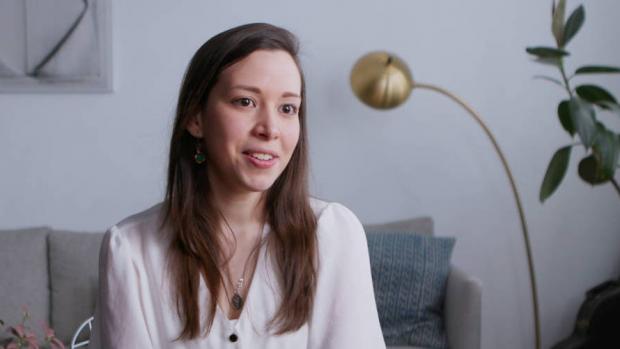Daniela Blanco and Sunthetics are ready for their close-up now
The Tandon-born company features prominently in a National Geographic documentary

Alum Daniela Blanco in the documentary “Own the Room”
In April 2019 it was exciting to report that Daniela Blanco, then a Ph.D. candidate, had taken home top honors in the Global Student Entrepreneur Awards (GSEA), an annual competition for founders who were launching startups while still in college. Exciting — but far from surprising. Her company, Sunthetics, with its mission to introduce greener production methods to the chemical-manufacturing world, had already garnered a $100,000 Technology Venture Prize (part of the NYU Stern $300K Entrepreneurship Challenge), the $20,000 top prize in the InnoVention Competition at Tandon, a $20,000 Stage II VentureWell grant, and top prize in the hotly contested Greentech category of the University Startup World Cup.
Blanco; her co-founder, Myriam Sbeiti (‘18); and Professor of Chemical and Biomolecular Engineering Miguel Modestino, their chief technical advisor, took NYU and NYC by storm back then with their innovative method of using water, plant waste, and solar energy to manufacture nylon, instead of the fossil fuel commonly used. The attention was well-deserved: their solar-powered reactor used 50% less energy and less raw material, while producing less waste and removing 20% of carbon emissions, presenting the potential to transform the entire chemical-manufacturing industry.
Now the entire world is getting to hear about Sunthetics thanks to Own the Room, a National Geographic documentary by Emmy Award-winning directors Cristina Costantini and Darren Foster, now streaming on Disney+. The filmmakers followed Blanco and her fellow contestants as they discussed their lives, educations, and entrepreneurial dreams. And even if you remembered hearing that Blanco had triumphed at the GSEA back in 2019, Own the Room provides plenty of edge-of-your-seat moments (along with some that will have viewers reaching for the tissue box).
Blanco, raised by a single mother in Venezuela amidst that country’s worsening economic and political crises, describes her pride in being an immigrant to America and her desire to prove that no matter where you come from, you can do great things given the right encouragement and resources. “Where we come from does not define where we’re going,” she says. “I’m a direct example of that.”
She has kept in touch with many of her fellow competitors, who included Jason Hadzikostas of Greece, who has devised a method of translating what babies want when they cry; Alondra Toledo of Puerto Rico, creator of an app that allows deaf people to communicate more easily with doctors; and Santosh Pandey of Nepal, whose company, Offering Happiness, lets Nepalese people who work abroad send confetti, cakes, and other party supplies to family and friends back home. While the competition was heated, the general mood was congenial, and Blanco later said that if she were a venture capitalist, she wished she could fund each and every one.
That generosity of spirit is typical of her. While other start-up founders may be quick to paint themselves as self-made, Blanco credits Sbeiti and Modestino with much of Sunthetics’ success, and at one point in the documentary she asserts, “NYU made me,” explaining that without the $100,000 from NYU’s Technology Venture Prize and $20,000 from Tandon’s InnoVention Competition, the three would have found it magnitudes more difficult to get Sunthetics off the ground. (NYU Tandon is still proving instrumental to the young company, which receives office space and other resources at the school’s Urban Future Lab.) “NYU Tandon made me into both a scientist and an entrepreneur,” she says, “and that’s a combination I absorbed from day one there.”
Nor does Blanco stint on describing how much she owes her mother, Maria, and the enormous inspiration she has been. (That’s when those tissues might come in handy.) Among the many letters she has gotten since Own the Room started streaming are some from single mothers, happy to learn from Maria’s example. A percentage of the correspondence is also from young girls interested in STEM. “Myriam and I are out to prove that anyone who doubts a woman can run a chemical company is wrong,” Blanco says. “The chemical companies that exist right now were started by someone, so why can’t that someone be us?”
That’s a purely rhetorical question, given how much Sunthetics has grown since the GEAS. The company is now focusing much of its energy on the use of artificial intelligence and is thought to be among the first ever to employ AI to optimize an electrochemical process. Their findings were detailed in the prestigious Proceedings of the National Academy of Sciences, and they hope their innovative technique will advance overall industry adoption of more sustainable processes. Sunthetics’ seed round of funding is expected in mid-2021.
Considering the volume and variety of mail Blanco is getting, is there one piece of advice she thinks might prove widely useful — to women in STEM, single mothers and their daughters, immigrants, recent grads, or incoming Tandon students, for example?
“Don’t be afraid of what you don’t know; you’re capable of learning anything,” she answers. “In fact, don’t be afraid, period.”




